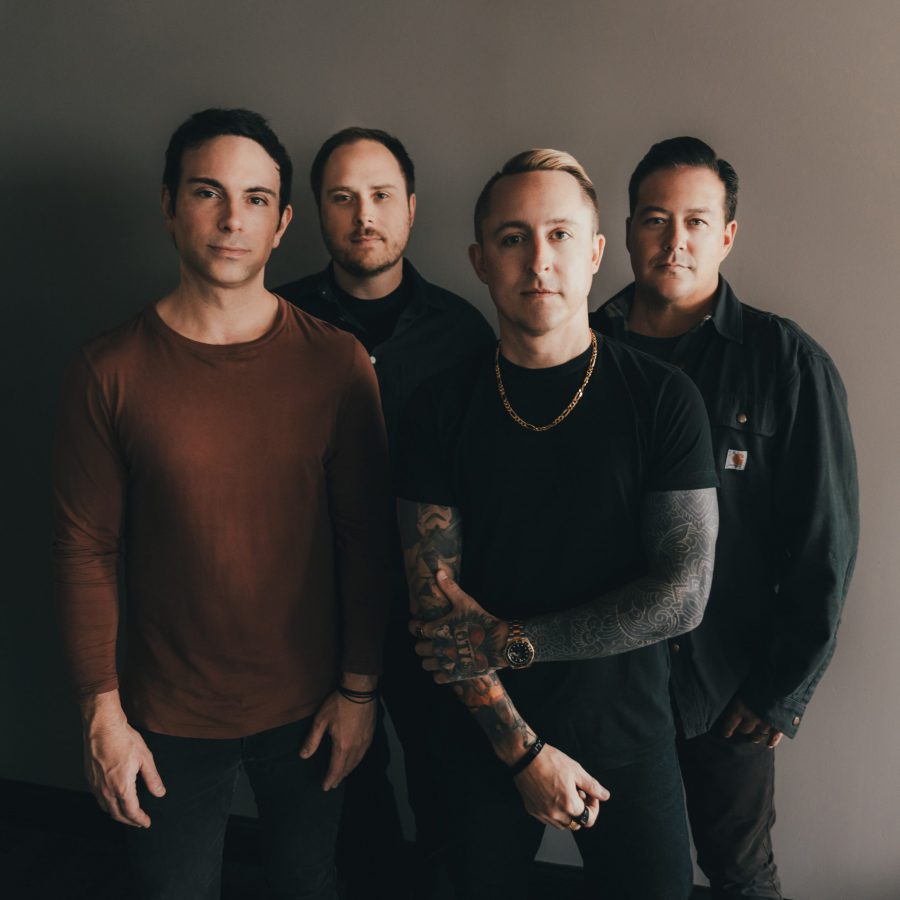INTERVIEW: Yellowcard celebrates 20 years of ‘Ocean Avenue’ and whatever’s next

Yellowcard, courtesy Acacia Evans.
If absence makes the heart grow fonder, then Florida rockers Yellowcard and their fans must be bursting with love.
Yellowcard
Mayday Parade, Anberlin, This Wild Life, Emo Night Brooklyn
7 p.m., Wednesday, Aug. 2
Bill Graham Civic Auditorium
Tickets: $64.
Vocalist and guitarist Ryan Key is sitting in a Chicago airport waiting to hop on a flight to South Carolina, where the band will continue its tour the next night. He’s still trying to make sense of their resurgence.
“These shows we’re playing are quite literally the biggest shows we’ve ever played in our entire careers,” he says. “These venues are two, three, sometimes five times larger than the venues we would play even at the height of [2003 album] Ocean Avenue. … It’s so overwhelming, the size and scale of what we’re doing right now, that it’s honestly hard to verbalize.”
The newfound success does have its perks. Key says he has difficulty sleeping on the tour bus, so he now has a runner after each show who takes him to a hotel room.
“It’s a very different style of touring than we’ve ever been accustomed to,” he says.
In 2017, this reality didn’t seem possible. The band had announced a final tour and breakup. Key describes it as closing the book on the band and moving on separately.
“For several years we had watched our ticket sales steadily decline; we felt like the interest in the band was waning, and we didn’t want to drag it out to the point of a slow, sad death,” Key says. “We wanted to go out with a bang and do it our way.”
The spark for a reunion was a one-off gig at Chicago’s Riot Fest last year. Key says Live Nation asked the band about touring again and offered up a mix of amphitheaters and larger music halls.
“Where did it come from? How did this begin again? I don’t really know the point of origin,” Key says.
Given the resurgence of early 2000s music and the pop-punk and emo genres, Key acknowledges it’s easy to look from the outside with cynicism, but that Yellowcard’s decision to return was both organic and authentic—not a cash grab.
Yellowcard didn’t only reunite to tour, but recorded five songs for its Childhood Eyes EP. Now living in different cities, the members went to Austin for a writing session, where violinist Sean Mackin was living.
“He was working a non-musical job and was doing really well in a post-Yellowcard career,” Key says. “Sean would come home from work every night, and we’d just bust the guitars out and hang.”
The informal pace of writing and pre-production at an Airbnb lent itself to the style of the music Yellowcard envisioned. That meant getting back to the sound its fans loved, after a couple of albums Key says were more experimental and meant to push their abilities as songwriters. Back then they’d gotten burned out on pop-punk
“You don’t want to be 43-year-olds trying to sound like 23-year-olds,” Key says. “But when you’re all in a rental house sipping whiskeys together, playing guitar, it has the feeling of being 23 years old—like the whole world is ours to conquer.”
The band members were all 20-somethings in 2003 when they released the smash “Ocean Avenue.” The album of the same name would go on to live in pop-punk lore as one of the era’s defining albums. Moving from small-time to primetime was a big shift for Key, who adds that he wasn’t prepared for what was to come. Within two years, Yellowcard went from playing bars to the MTV Video Music Awards in Miami.
With that rise came the pitfalls of stardom. The band fell into the rock and roll lifestyle that has doom many others, Key says.
“I wasn’t taking very good care of myself. I was out all the time, maybe thinking I was a little more special than I should have thought I was,” Key says. “The ego gets a hold of you, and I was also struggling with a lot of insecurity about my role and my responsibility and my ability as a singer.”
The success starting to unravel. Two years later Key had to take a forced break to get vocal cord surgery, a product of pushing himself too hard. In the long run, however, he says slowing down made him a better performer and a better person.
The current tour is meant to celebrate Ocean Avenue and other songs that meant so much to fans at the time. How’d he pick the set list?
“In the age of algorithms and metrics, you have an interesting window into which songs resonate the most with people,” he says. “You can literally go look at our top streamed songs on every platform.”
There’s not a lot of deeper cuts in the mix, but Key says there’s time for that down the road. Yellowcard is back and already trying to make time to record again.
At each show, Key asks for a show of hands of who’s seeing Yellowcard for the first time. He says he’s floored how many people raise their hands. As for the others, he’s amazed how the songs still resonate 20 years later.
“It’s all about, whether we knew it or not, how special the thing that we created ended up being,” he says.
Follow writer Mike DeWald at Twitter.com/mike_dewald.
